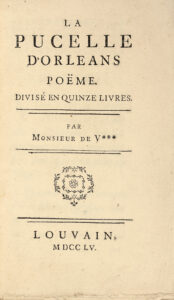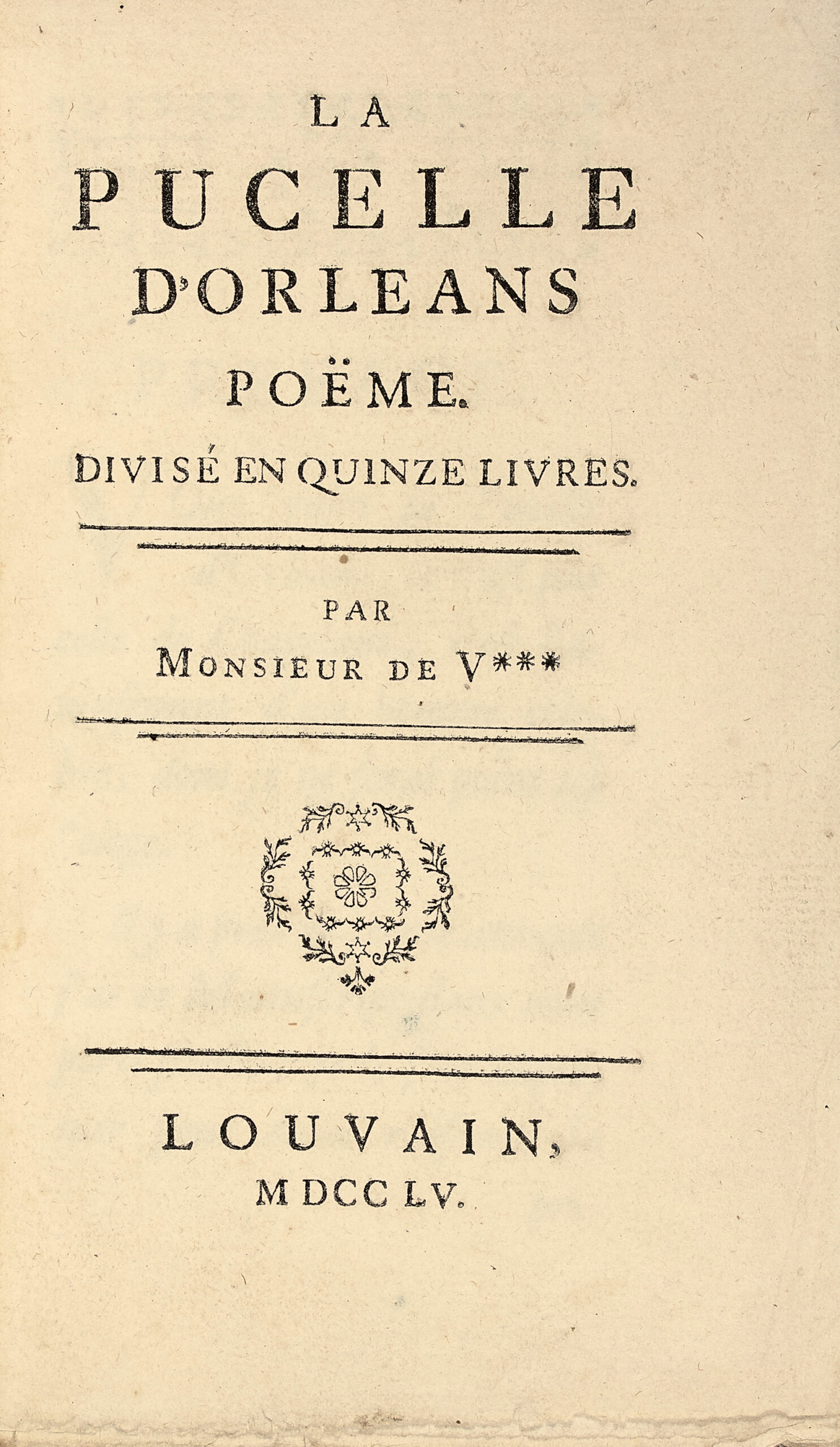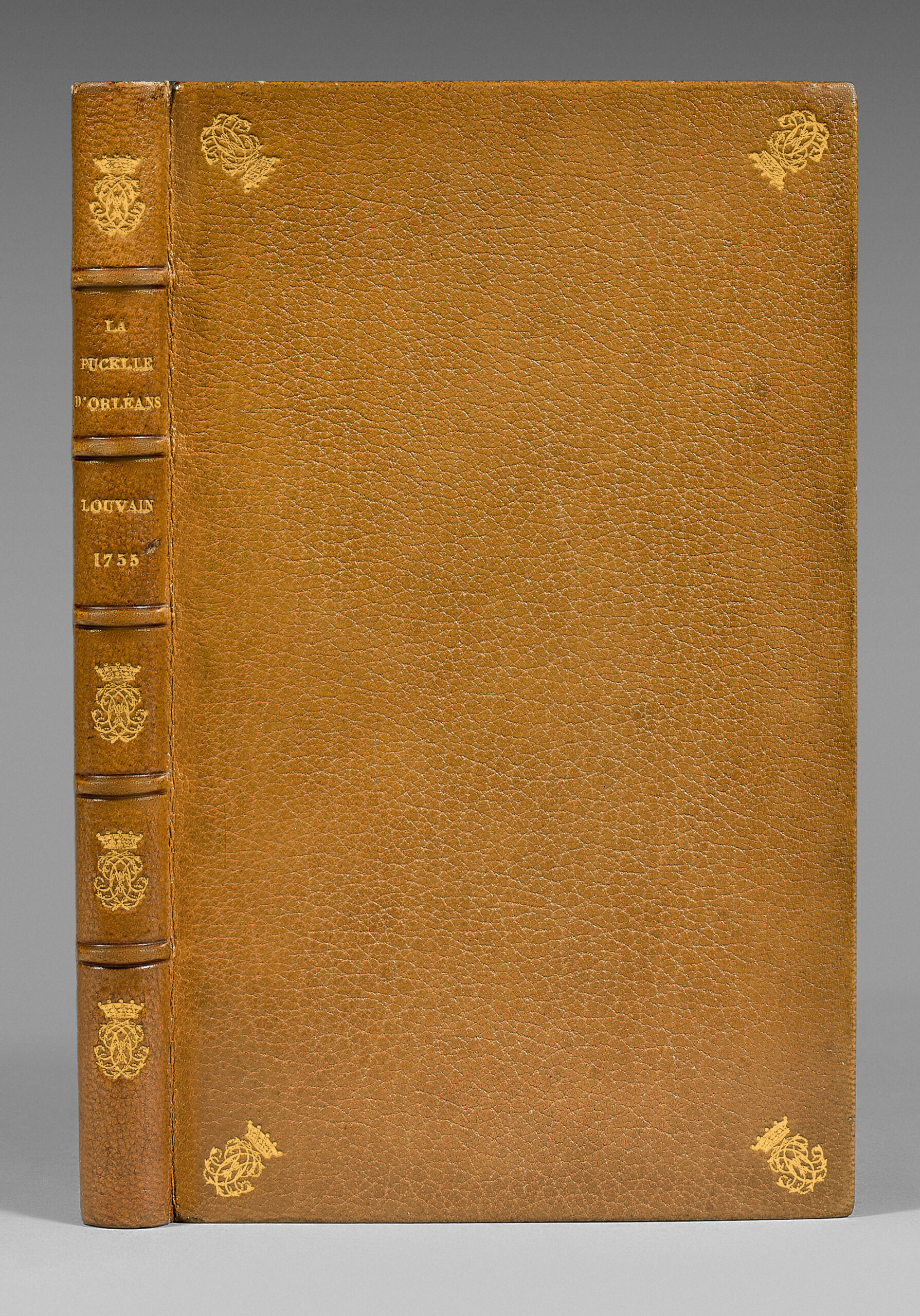Louvain (Francfort ?), 1755.
Small 8vo, (2) ll., 161 pp.
Full citron morocco, gilt initials in the corners of the covers, ribbed spine decorated with the same repeated gilt initials, inner gilt border, gilt edges. Motte.
175 x 105 mm.
First edition and first issue – extremely rare – of one of the masterpieces of the Age of Enlightenment, Voltaire’s violent attack against superstition and religion.
Bengesco, I, 478; Le Petit, Éditions originales françaises, pages 546-547; Catalogue de livres rares du baron de Ruble, n°261 (the present copy);
La Pucelle was condemned by decree of the Court of Rome on January 20, 1757 (Index librorum prohibitorum. Modoetioe, 1850. 16mo, p. 262).
In September 1757, in Paris, eight private individuals, printers and bookbinders, were condemned to the carcanon in the Grève, and to three years’ banishment, following the discovery of a clandestine printing shop found rue de Seine, faubourg Saint-Victor, and where, says Barbier, “there were verses against persons constituted in dignities, Voltaire’s La Pucelle d’Orléans, and other similar works”.
“Long disowned by Voltaire, who claimed to be its author only in private, this poem, which has become so famous, first appeared in 1755.” P. Larousse.
“This satire respects nothing and no-one, as witness the visit of the clumsy monk, Lourdis, to the kingdom of Sottise, where all human stupidity is to be found, and which the poet describes meticulously and with verve: as well as the famous episode of the celestial struggle between Saint Denis, who is for the French, and Saint George, who is for the English. No moral scruples trouble Voltaire’s light-hearted inspiration; it is this sparkling casualness, combined with the liveliness of the satire, that makes ‘La Pucelle’ a masterpiece”. Dictionnaire des Œuvres.
“The 11th song and the donkey episode, the most scabrous of the poem, were composed between 1738 and 1748; Voltaire, on seeing the donkey episode printed in the edition given by the Capucin Maubert (Louvain, 1755, 12mo), cried out loud and complained to the police lieutenant, saying that it was an infamy to persecute him as the author of this obscene song; it is quite certain, however, that it is his own, and when he complained about “the detestable verses and revolting turpitudes” with which the copies circulating were full, he knew what he was talking about, for he had enameled these copies himself, so as to be able to disavow them. None of this would be excusable today, but we have to take into account the situation of the press at the time, the arbitrary gagging of the press, and the power still held by the clergy to have the book and sometimes the author burned. Reduced to hiding, Voltaire loaded with obscenities and verses the work he would have liked to make only banter”. P. Larousse.
Voltaire had a particular affection for this book, which he called “my Jeanne”. The composition of La Pucelle d’Orléans, which began in 1730, took place gradually over a period of twenty years. Voltaire sent the songs as they were written to friends and relations, including M. d’Argental, the Duc de La Vallière, Frédéric II de Prusse and the Marquise de Pompadour, so that numerous manuscripts were in circulation. Contradictory rumors circulated: some suggested that Voltaire had employed copyists to produce multiple manuscripts containing sulfurous verses and turpitudes that he inserted on purpose. The other, more official, version of events asserted that Voltaire was outraged by the inadmissible alterations made to his poem. As a result of this sulfurous reputation, “a veritable black market was organized and, according to the newspapers of the time, there were over six thousand copies, often with falsified text” ( BN, Voltaire, n°331).
In 1755 the original edition in fifteen books (by M. de V***, Louvain) finally appeared, which Voltaire prudently refused to take on, true to his principle: “Philosophers should be like little children: when they have done something, it’s never them, it’s the cat that has done everything”. The same year saw the publication of other editions under different imprints. The dispersal of printing sites was the only way to compensate for the weakness of production and the slowness of transport. It was also the best way to circumvent bans. (Remember that La Pucelle was condemned by decree of the Court of Rome in January 1757, and that eight printers and bookbinders were sentenced the same year to the stocks and three years’ banishment!). In 1762, Voltaire decided to publish a first official edition in Geneva with Cramer.
Precious and beautiful very wide-margined copy (height 175 mm) from the Lurde and Ruble libraries (Cat. 1899, n°261).


